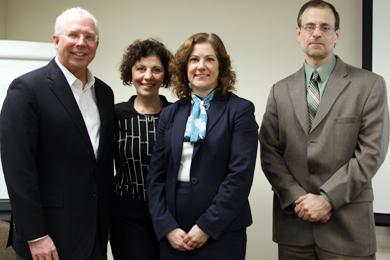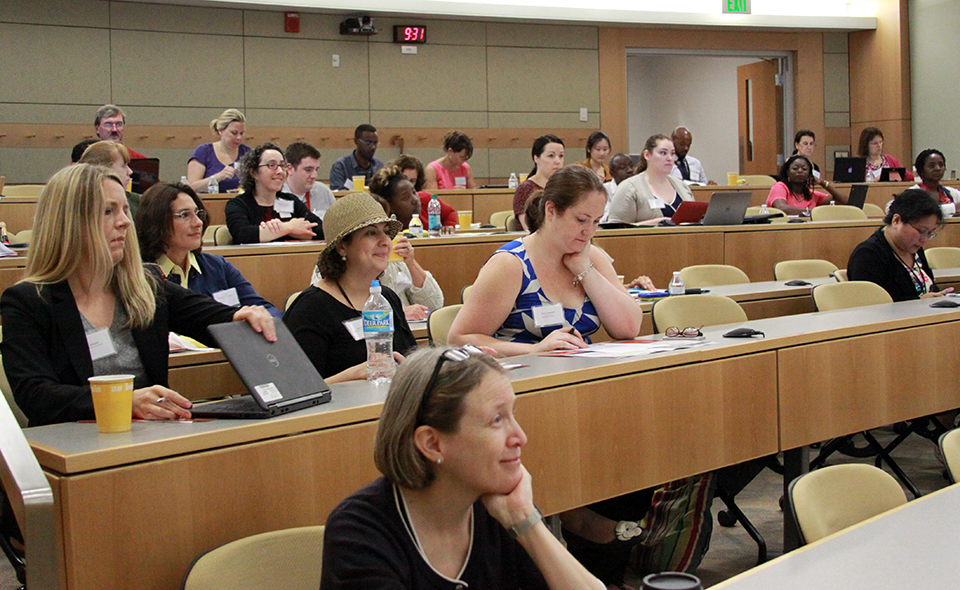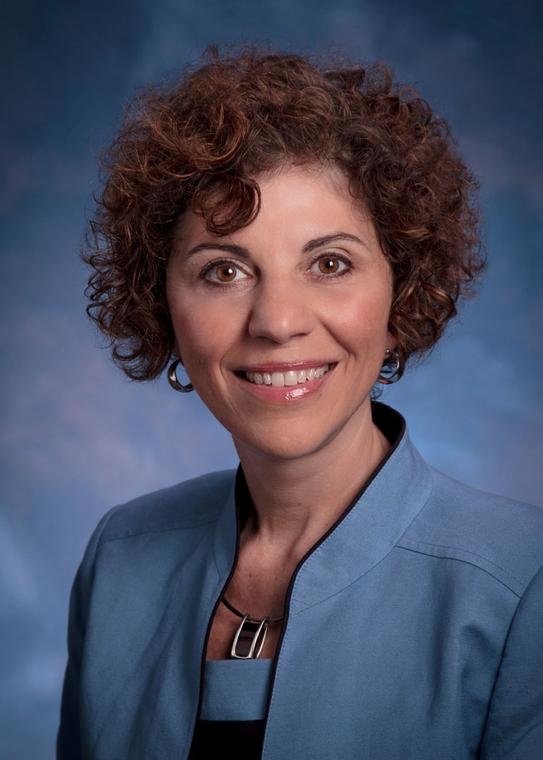PHSR Seminar Shows Real Applications for Comparative Effectiveness Research
Representatives from Novartis Pharmaceuticals Corporation (NPC) speak with graduate students about the excitement and challenges surrounding this emerging field of research.

By Malissa Carroll
March 11, 2014
On Feb. 24, the Pharmaceutical Health Services Research (PHSR) Graduate Program at the University of Maryland School of Pharmacy welcomed three representatives from Novartis Pharmaceuticals Corporation (NPC) for an informative seminar designed to educate graduate students and postdoctoral fellows about real world applications for comparative effectiveness research (CER). Organized by Eleanor Perfetto, PhD, MS, professor in PHSR, the seminar also highlighted the research of four graduate students in the department and featured a discussion with faculty about their expertise and research interests.
“The seminar offered a great opportunity for our students to interact with individuals from one of the many stakeholder groups in health services research – the pharmaceutical industry,” says Perfetto. “It also gave them a chance to better understand stakeholder perspectives and learn about the wide range of job opportunities available to them once they graduate.”
A world leader in providing health care solutions that address the evolving needs of patients and societies, NPC was represented at the seminar by Dean Hakanson, MD, vice president of health economic and outcome research in US medical affairs; Melody Hughson, JD, executive director of health policy; and Stephen Arcona, PhD, executive director of outcomes research methods and analytics.
“The students in this program represent the future of our industry, and I wanted to take this opportunity to speak with the future,” said Hakanson. “Not only did I want to talk about what we are currently doing in the industry, but I also wanted to hear about what they are doing and answer any questions that they might have about CER. It’s a very important trend to which NPC is dedicating a lot of resources and looking for individuals with the appropriate talents, skills, and capabilities.”
When evaluating potential treatment options for their patients, health care providers know that every patient is different, and that those differences should be taken into consideration to help each patient obtain the best health outcome for his or her unique situation. While it does not tell health care providers which treatment option to choose, CER does help providers make more informed decisions by comparing different medications, medical devices, tests, surgeries, and other ways to deliver health care to provide evidence on the effectiveness, benefits, and harms associated with those different options.
Kicking off the seminar, Hakanson shared how he first became involved in health outcomes research and discussed NPC’s practical approach to CER, including the challenges encountered by researchers in the field and early CER-related projects undertaken at the company. An ambassador for the Patient-Centered Outcomes Research Institute (PCORI) – an organization authorized by Congress to conduct research that gives patients a better understanding of the prevention, treatment, and care options available, and the science that supports those options – Arcona followed Hakanson, discussing PCORI’s history, funding tracks, and how its research findings are used.
“Once students enter the real world, there are a lot of opportunities for them to contribute to and understand how broad CER is,” said Arcona. “For example, PCORI strives to have patients and their caregivers drive all aspects of the research process, from the formulation of research questions to the dissemination of the findings. While there are qualified researchers across the country who are actively engaging patients in their work, nobody has attempted to measure whether or not this engagement makes a difference in patients’ outcomes.”
Reflecting on the seminar, PHSR graduate student Michelle Campbell said, “It offered a great opportunity for us to learn about what is really happening in the pharmaceutical industry, get their perspective on current research trends, and understand the challenges that they have encountered. As students, we learn a lot about the theory behind CER, but these individuals were able to offer insight about what is really going on.”
Following the seminar, Campbell and fellow PHSR graduate students Abdalla Aly, F. Ellen Loh, and Joseph Vandigo had an opportunity to share their research with Hakanson, Hughson, and Arcona, who were eager to learn about the types of questions being posed by the next generation of researchers. “Although it is helpful for students to understand our industry and learn about the types of research that we are conducting, I think it is even more exciting for us to learn about the topics in which they are most interested,” said Hughson.
Vandigo, who presented research from his dissertation titled “Impact of Medicare Contracting Reform on Colon Cancer Treatment and Outcomes,” appreciated the unique opportunity to share his work with representatives from one of the world’s largest pharmaceutical companies in an informal environment.
“This seminar offered an excellent opportunity for bi-directional learning,” he said. “They were able to share with us information about what is currently happening in their industry, while we as future researchers had an opportunity to share with them information about what is coming down the pipeline.”



